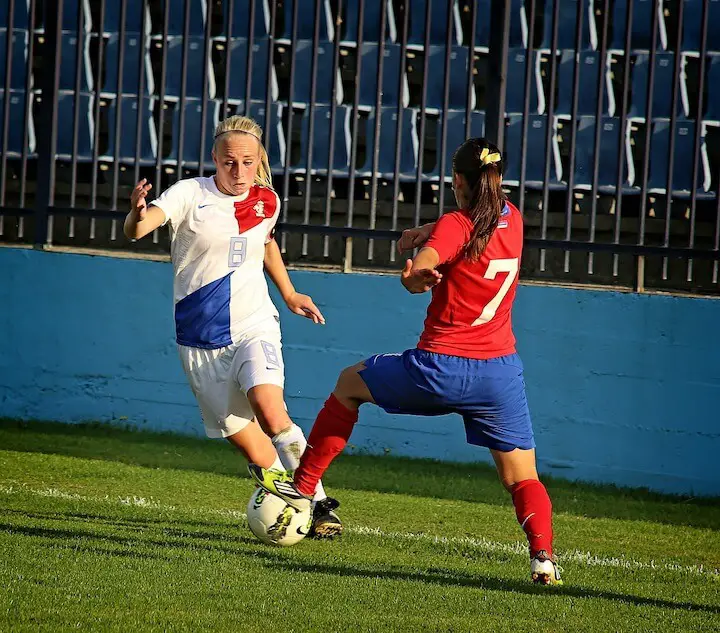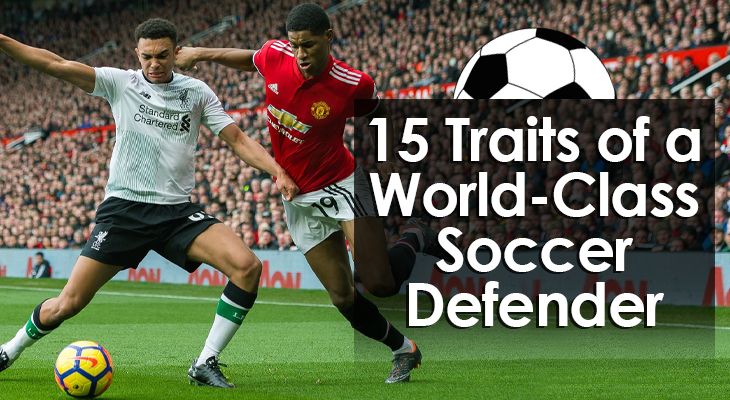15 Traits of a World-Class Soccer Defender (Position Guide)
In traditional history, the role of a soccer defender was simple enough...
Keep the ball away from your goal.
It didn’t matter much whether you were a center back or a fullback, your first and single most important duty was to defend your goal.
Every other thing was secondary.
Then came the players who revolutionized the defensive roles.
They morphed the job description from basic to something more exciting.
We’ve had players such as Roberto Carlos -- a defender but perhaps better known for his skill on the ball and his contribution in the attack.
Today, a soccer defender does a lot more than just defend...
In fact, there are defenders who, on paper, play in defense, but the positions they occupy on the pitch and the way they influence the game stretches far beyond that position.
An example of this is Trent Alexander-Arnold.
He is the chief playmaker for Liverpool Football Club, despite playing from right-back.
All these affect how effective a defender is in today's game.
To be among the very best soccer defenders, you need to show a unique blend of mental, physical, and technical skills that go far beyond simply making tackles and clearing your lines.
Mental Traits:
As a defender, a large part of what you need to be world-class are exceptional mental attributes.
Physical qualities will only get you so far.
To be able to perform at the highest level, you'll need a few of these attributes:
1. Composure
Much like forwards, top defenders must be extremely composed.
The pressure of knowing that any mistake on your part could be costly for the team can be daunting for some, which often leads to overthinking and errors.
The true hallmark of a world-class defender is the ability to remain composed regardless of opposition and stage.
A composed defender is also less likely to be rash in the challenge, and be able to make better-timed tackles, interceptions, and blocks.
In this regard, there is much to learn from one of the most composed, world-class defenders in the game today - Liverpool and the Netherlands’ Virgil Van Dijk.
Check this out...
2. Communication
Preventing a goal is more easily achieved as a unit, and there is the need for clear communication to make this happen.
If one player in the defense is not on the same page as the others, an error from that player can be costly for everyone.
This is why we often see goalkeepers barking orders at the players in front of them, telling them where to go and what to do.
The same principle applies for defenders.
Everyone needs to be able to communicate effectively throughout the game.
They must remind each other of the game plan and charging slackers back to life.
A practical example of how communication can be crucial is an instance where a defensive line is trying to play the offside trap...
One defender is lagging behind the line completely oblivious of the movement of the others, and another defender has to tell them what to do.
At the top teams, there is often a "leader" at the back that does most of the communication.
An example is Thiago Silva of the Brazilian national team and club side Chelsea Football Club.
3. Concentration
In a regular game, strikers can often afford to make defensive errors without getting punished.
This is because there's still a lot of ground to cover even if they lose possession in the final third.
Soccer defenders, on the other hand, do not have this luxury.
Any mistake at the back has a good chance of getting punished, especially against top players.
This makes it crucial for a defender to have high levels of concentration throughout the game.
Ninety minutes is a long time to remain focused, especially if the defender has had little to do in that time... but there are many cases where a lapse of concentration from the defense in injury time leads to a conceded goal.
A world-class defender simply cannot let that happen.

4. Anticipation
A world-class defender cannot afford to be reactive all the time.
Often, you need to anticipate the decision of the attacker and set yourself up to defend against it BEFORE the move is actually made.
This is because, in real-time, the speed of the game may not provide enough time for the defender to react to a move before getting punished with a goal.
This particular mental trait will see a lot of improvement as a player trains more regularly and gets more experience from real game time.
As unpredictable as the game is, there are patterns of play that repeat themselves.
An experienced defender in soccer is more likely to be able to predict these patterns and prepare for them than a rookie defender would be.
5. Bravery
Soccer has seen real warriors on the pitch such as Fabio Cannavaro, Nemanja Vidic, and Giorgio Chiellini.
These players were never afraid to put their bodies on the line to prevent a goal, and they even got injured while doing so sometimes. (video below)
A world-class defender should never be afraid to go into a challenge.
Whether it's for a goal-line clearance, a last-man tackle, or other similar potentially dangerous situations, the best defenders are courageous.
6. Positioning
To some degree, this trait works hand in hand with anticipation.
The same level of experience that enables a defender to predict moves also gives the player a good idea of where to be and when to be there.
A defender who has mastered this trait will find that it is easier to make defensive actions such as tackles, interceptions, and blocks.
Your positioning reduces the need to cover ground before reaching your target.
For a fullback, positioning is doubly important -- especially in modern soccer where fullbacks are often asked to push forward to support the attack.
This makes it easier to be out of position, and the opponent will exploit your side of the field whenever possible.
With that in mind, finding the right balance is crucial.
Technical Traits:
Defenders are often perceived as the least technical players in the squad (after the goalkeeper).
However, as we suggested earlier, the game has evolved to a point where playing defense also requires a great level of technique.
The following attributes are very useful to have:
7. Heading
This is less to do with winning aerial duels, and more to do with the efficiency of aerial possession.
I’ll explain:
Imagine a defender wins an aerial duel but heads the ball right back to the opposition more often than not. That says the player may be good in the air physically, but has limited technical ability with aerial balls.
A defender with strong heading ability is an asset at both ends of the pitch.
Whether it be defensive headers that clear the ball out of danger, or attacking headers from set-piece chances that the team gets.
8. Crossing
This skill is most useful for the full-backs.
Center-backs usually spend most of their time in the middle areas of the defensive third, so there's rarely an opportunity or a need to whip crosses in.
Full-backs on the other hand will get many opportunities to cross, due to the fact that they operate from the wings.
It gives the team an extra dimension in attack.
Whether the player is loading the ball into the box with an early cross or getting down the byline to square a pass back into an attacker.
Full-backs that can whip a good cross in are a premium find in the modern game.
As evidenced by world-class defenders such as Barcelona’s Jordi Alba, Liverpool’s Andrew Robertson, and Bayern Munich’s Joshua Kimmich.
9. Marking
Defenders must make some passive defensive actions, and marking is one of these.
Unlike actions such as tackling where you actively engage the ball, "marking" is a more patient, tactical approach.
Imagine a scenario where a center-back is all alone against two attackers bearing down on goal.
It would be risky to go after the player in possession as they could just easily pass the ball to the other attacker who would then be through on goal.
A defender with great marking skills would be more patient and try to mark both players at the same time.
They do this by filling a space and placing themselves in a strategic position.
One where they make it difficult for the player to pass the ball, but also possible to make a last-ditch tackle on that player if they decide to score.
10. Tackling
Quite simply, tackling is the ability of the defender to win possession back from an active player.
Unavoidably, there will be some fouls in the process, but a top defender can often make clean tackles and win possession all within the rules of fair play.
On average, full-backs tend to attempt more tackles than center backs as they tend to face more dribblers on the wings.
This skill, however, is a must for every defender.
11. Passing
If you take a look at most of the top teams in the biggest soccer leagues today, they tend to dominate possession in most of their games.
For a possession-based system to work, it's important to have players who can pass the ball well -- and this includes the defenders.
Some teams even play with defenders that can switch play from back to front with an accurate long ball forward.
The best players play for the best teams, and the best teams often require good passers of the ball.
Physical Traits:
Undoubtedly, physical attributes contribute to the overall efficiency of a defender.
One needs to be able to deal with all kinds of physical threats...
- Fast players
- Quick players
- Strong players
The best way to do so would be to work on your own attributes to match those threats.
Here’s what you’ll need:
12. Aerial Ability
This is less about your technical heading ability and more about sheer jump power -- the ability to beat an opponent to a header.
It's quite useful for defending set-pieces or open play crosses.
This can also give your team a chance to win possession from second balls.
13. Strength
This is one attribute that you can maximize your potential on with some serious work in the gym.
Strong attackers can be a nuisance to deal with, and a world-class defender should be strong enough to compete when required to.
14. Speed
Similar logic applies here.
Defenders often come up against pacy attackers, and they can be really tricky customers -- especially from wing-play.
Full-backs perhaps need this attribute the most, considering the fact that they get up and down the pitch quite often during a game.
However, center-backs also need to have a good amount of pace in their inventory.
Especially in the modern game where quick attackers are standard for many of the top teams.
15. Stamina
This is the most basic requirement of all the attributes discussed in this text.
Any professional soccer player performing at the highest level must be FIT.
One cannot afford to be a defender that gasses out early in the game because concentration levels will be severely impacted.
Professional soccer clubs, though, incorporate stamina training in most of their drills.
So unless there is an underlying health issue, this should not be a problem for a world-class player with a top team.
Conclusion
Playing as a soccer defender may not be as flashy as being the attacker that scores goals for the team, but the job description is just as important.
It doesn’t matter how many goals you score if your opponent can score even more.
A popular saying in soccer goes,
“A great attack wins you games, but a great defense wins you titles”
We couldn’t agree more.

